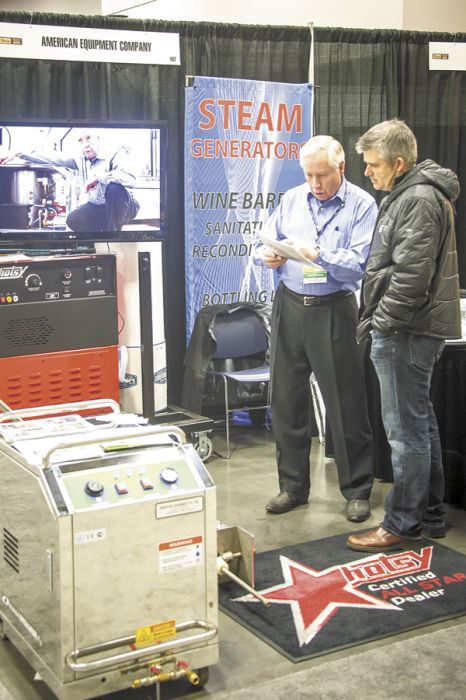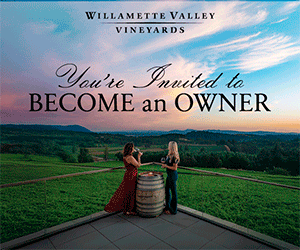Meeting of the Vines

By Karl Klooster
For the second consecutive year, on Feb. 19–20, 2013, the Oregon Wine Industry Symposium took over the Oregon Convention Center in a show of significance reflecting the stature of the state’s most prominent agriculture-based enterprise.
Of course, wine is far more than sophisticated farming, as crucial as that may be to the outcome. The ambrosial end product conjures up all manner of intense interest and copious comment.
As Oregon Wine Board Executive Director Tom Danowski concluded in his address to luncheon attendees, “There has never been a better time for Oregon wine.”
And so it would seem that the wine industry is emerging from the economic doldrums of the past few years, shaking off far fewer adverse effects than originally anticipated.
One look at the sprawling Convention Center hall filled to capacity with vendors left no doubt that Oregon wine is on a roll.
Interesting to note, wineries and vineyard owners may be the hosts of this event, but they are also the beneficiaries. Every business and individual at the symposium came there to show their wares. Some 160 vendors, offering everything from labels to legal assistance, nurseries to shipping services, corks and bottles to cooperage and insurance coverage were eager to interact with these potential clients.
To be sure, the trade show in the big hall was the main attraction, Of equal importance, however, were a series of seminars targeting various aspects of the wine industry.
Highly regarded speakers led business, viticulture and enology tracks that ranged from defining your brand to cutting-edge technology in wine grape research to innovations in sustainable spray technology.
Ted Baseler, President and CEO of Ste. Michelle Estates, delivered the keynote presentation entitled “The Importance of the Oregon Brand.” His company purchased Erath Vineyards in 2006. Since he went to work for Ste. Michelle in 1984, the company has grown from $14 million to $561 million in annual sales, making it the seventh largest wine company in the country.
Baseler described how the potential is unlimited for Oregon wine and its growth is outpacing such major wine producing areas as Italy, Australia and neighboring Washington State. He stressed the value of cooperation among the Pacific Northwest wine growing states — Oregon, Washington and Idaho — in drawing attention to the merits of the region both nationally and internationally.
It’s particularly interesting to view the symposium from the perspective of those who contract for a booth, set it up and then sit there waiting for good prospects to wander by.
Most of these participants don’t attend the seminars and may or may not even go to the splashy dinner highlighting the affair. This year the sold-out event was catered by preeminent Portland restaurateur Bruce Carey at the Doubletree Lloyd Center.
Instead, they come in search of additional business, to meet and greet past and existing clients and perhaps just as importantly demonstrate their support for the industry by being there in the first place.
Let’s look briefly at just three of these exhibitors: Pihl Excavating, ShipCompliant and American Family Insurance. Each of these companies performs different but vital services.
When a winery wants to build a new building or put in a vineyard, site preparation is essential.
Matt Pihl, owner of Pihl Excavating, finished his first winery project in 1998. “Willamette Valley Vineyards had just bought Tualatin Estate outside Forest Grove. We were nearby in Banks, did a good job and started getting referrals from there.”
Pihl (pronounced “peel”) has since helped dozens of wineries around northwestern Oregon plan and execute site preparation for their wineries. Additionally, his massive earthmoving and reshaping equipment has been used to prepare thousands of acres for vineyard planting.
When a winery needs to ship wine directly to a customer, understanding and properly complying with the myriad rules and regulations state by state is essential.
Ken Vasko, marketing director of Denver-headquartered ShipCompliant, promotes a service helping hundreds of wineries keep on the straight and narrow in sending hundreds of thousands of bottles to customers in the 38 states that allow shipping.
Vasko said, “The Supreme Court decision of 2005 opened the floodgates for interstate wine shipping. We’ve been going at top speed to serve clients around the country ever since.”
When a winery has employees, structures and machinery, the potential for liability always looms. Therefore, making certain you are insured against loss is also essential.
Agents of American Family Insurance in states where wine is an important part of the economy offer coverage tailored specifically for the industry.
Quoting from the company’s message to agrarian clients, Oregon state sales director Rob Quesnel said, “Let American Family protect your land-based legacy with coverage that works as hard as you do.”Their pitch has persuaded dozens of winery owners to purchase comprehensive coverage plans from Quesnel and his team of agents around Oregon.
It’s all part of the dynamic business activity propelling the industry in America’s fourth largest winemaking state, continuing its climb to world prominence.










